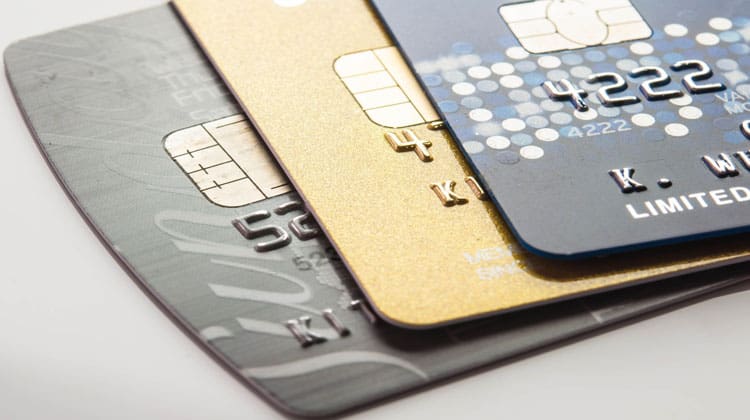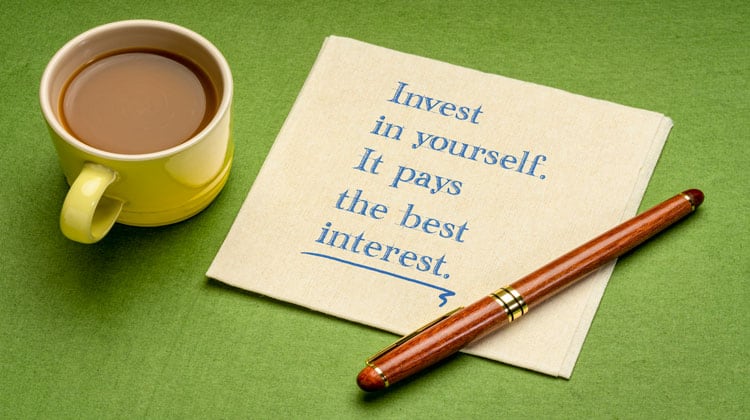THIS POST MAY CONTAIN AFFILIATE LINKS. PLEASE SEE MY DISCLOSURES. FOR MORE INFORMATION.
Are you feeling financially secure?
If not, don’t worry. You’re not alone.
Many people are struggling to make ends meet in today’s economy.
But if you’re looking for signs that you’re on the path to financial stability, look no further.
In this post, I share the many things that show you have a solid financial foundation.
I’ll also present a blueprint on how you can start to achieve some of these milestones to achieve financial stability.
Table of Contents
29 Signs You Are Financially Stable
What Does It Mean To Be Financially Stable?

Financial stability refers to having your money situation on a firm foundation.
If we compare it to housing, a financially stable dwelling is one with a solid concrete foundation that passes inspection and shows no signs of crumbling.
To stabilize your finances, you must also have a firm foundation built on timeless money principles.
Then you build upon these so your financial life can survive and thrive.
Being financially stable means you understand how to use your money, not that you have more money to work with.
- Read now: Discover the best Ted Talks about money
You have most, if not all, of your debt paid off, and paying living expenses is not a painful task.
Financial stability means you earn money and have the financial literacy to use it responsibly and prepare for the future.
Here are some of the most significant signs you are doing well financially.
#1. You Have A Checking Account
Did you know that according to the FDIC, over 7 million people don’t have a bank account?
A checking account is a fundamental way to have your finances in order.
And in today’s world, there is no excuse.
Plenty of banks don’t charge monthly fees, and most have mobile apps that allow you to do 99% of your banking without visiting a physical branch.
The benefits of having a checking account are enormous.
First, you can save money when you have to cash a check.
Next, you save time because you don’t have to find a place to purchase a money order. You can simply write out a check or pay your bills online.
- Read now: Here is how to write a check in under one minute
- Read now: Find the best places to buy money orders
Finally, balancing your bank account will help your wealth grow too.
#2. You Have Emergency Savings
An emergency fund for unexpected expenses is another crucial part of financial stability.
When an unexpected expense comes in, it can quickly throw your financial life into a whirlwind.
But when you have an emergency fund, you can pay for these expenses and not have it destroy you financially.
The question of how much cash to have in your emergency fund differs based on who you talk to.
Some people recommend a three-month emergency fund, while others suggest more.
I recommend at least 12 months of living expenses saved up.
But as long as you have something saved for emergencies, you are on the right track.
#3. You Have a Separate Savings Account
In addition to having emergency savings, you also have separate savings accounts.
These additional accounts help you to save for goals or other major expenses.
For example, you put money aside for upcoming vacations.
Or, if you pay your car insurance premiums annually, you put money into an account each month, so when the bill comes, you can pay it.
#4. You Pay Bills On-Time Or Early

When your total monthly income is more than your money going out, you’ve created financial stability that allows you to set and forget your payments.
Setting and forgetting your payments means there is no risk of late fees or failing to pay your bills.
Your good financial habits translate to a more hands-off approach.
You can automate transfers to your savings account or retirement plan without worrying about needing that money shortly.
#5. You Don’t Overdraft Your Account
While over drafting might have been a crutch you leaned on before, leveraging this service is an easy way to incur costly overdraft fees.
These are often crippling amounts that don’t correlate to the service offered and strike when you’re at your lowest.
When you’re financially stable, you aren’t over drafting your account.
You have enough money to cover your monthly bills, and nothing surprises you because you are on top of your finances.
- Read now: Discover what overdraft protection is
#6. You Budget Your Money
While you might not have a formal budget, you know how much income you earn each month and how much you spend and save.
You make it a point to keep your spending in check so that you can save as much as possible every month.
When you get a raise, you don’t spend it but instead increase your savings.
- Read now: Learn how to start a budget
#7. You Actively Try To Lower Your Expenses
It’s easy to just pay your monthly expenses without thinking about how much you are paying or how much the cost of things has increased.
But many financially successful people take an active approach to their bills.
They make it a point to call up their trash company or their cable company and try to get their bills reduced.
- Read now: Here is how to get Xfinity deals for current customers
- Read now: Find out how to lower your Verizon FiOS bill
Sometimes, they even negotiate prices when they shop by asking for discounts here.
#8. You Don’t Carry Unnecessary Debt
Financial stability doesn’t necessarily mean you’ll be completely debt-free, but you’ll be able to cover all your debt payments and stay away from bad debt such as:
- Credit cards
- Payday loans
- Title loans
- Personal loans
You may still have student loan debt, car payments, and likely a mortgage, but these allow you to live comfortably and not interfere with your day-to-day finances.
#9. You Pay Off Your Credit Cards Monthly

If you shop with credit cards, you make it a point to pay off your balance in full each month and avoid credit card debt.
- Read now: Here is how to avoid debt
There is no carrying of balances from month to month and paying sky-high interest rates that take you away from financial security.
#10. You Take Advantage of Credit Card Rewards
Speaking of credit cards, despite their risks, you know credit cards can be a valuable tool.
Credit cards are convenient to use, commonly accepted, offer greater security, and many offer rewards points, miles, or cash back in exchange for your activity.
Saving money on travel or other expenses is easier when you use your rewards to offset costs.
#11. You Pay Extra On The Debt You Have
With any debt you have, such as student loan debt, a car payment, or your mortgage, you make it a point to pay extra money regularly.
You know that paying more than the minimum payments each month saves you on interest charges and helps you pay off the debt faster.
#12. You Take Out The Smallest Loan Possible
When it comes to taking out car loans or student loans, you put in the effort to make sure you are only taking a loan out for an amount you can afford.
You know that you don’t need a $65,000 luxury SUV, so don’t buy it.
You might even avoid a loan completely and pay cash instead.
#13. You Contribute To Your Retirement Savings
You know the importance of retirement savings, so you make regular contributions to your 401k, traditional IRA, or Roth IRA.
But you don’t just make small contributions.
You make it a point to save at least 10% of your income.
Doing this allows your money to grow until you need it later in life.
#14. You Are Financially Literate
While you don’t have an education in finance, your financial literacy extends beyond the basics.
And when you spend money, invest it, or make other financial decisions, you feel confident that you are making the best move for your situation.
#15. You Understand The Importance Of Investing In Yourself

You know that you are your greatest asset, which means you control how much you earn throughout your life.
It also means you have significant control in other areas of your life.
By working to be the best version of yourself, you increase your education levels and earn more income.
You also strengthen your relationships, which improves every other area of your life.
#16. You Have Appropriate Insurance Coverage
You understand that insurance coverage shifts some risk of loss away from you and onto an insurance company.
You don’t just view the payments you make for coverage as an unnecessary expense and, as a result, avoid coverage or get too little coverage.
#17. You Spend Money Without Guilt
When you have a high level of financial security, you can spend without worrying about the implications.
Spending money without worry means you can buy those things you want, and the increased spending around holidays and events isn’t a big deal.
You also avoid impulse spending.
Those with financial stability are often better at avoiding impulse purchases they later regret, and this protects your financial health just as much as savings and budgeting do.
#18. You Research Before Your Buy Big Ticket Items
Before you make large purchases, you take the time to understand what you need and don’t need.
You also research various models to understand features, pricing, and reliability.
Finally, you seek out sales or other ways to help offset the purchase price and use the money left over for future needs.
#19. Your Financial Situation Doesn’t Worry You
Money is a common culprit for keeping people awake at night and stealing their attention during the day.
Financial stability doesn’t mean you won’t worry about your finances or have to weigh your decisions, but it offers you peace of mind when going through your day.
When you’re financially stable, you aren’t spending time:
- Pinching pennies
- Worrying about how to cover bills
- Losing sleep over your financial matters
Becoming financially stable doesn’t automatically knock all stress out of your life, but it makes it a lot easier to feel secure in your situation.
#20. You Learn From Your Mistakes
Mistakes are a part of life, but you don’t let them get you down.
You also make sure you don’t repeat them.
When you mess up, you take the time to learn what happened and how to react or handle things differently in the future for a better outcome.
When you shy away from learning from your mistakes, you are bound to repeat them and stay stuck in a cycle of never improving.
#21. There’s No Financial Worry Around Losing Your Job

If you’re financially stable, then you have enough money in savings to cover your expenses if you lose your job.
Your finances are well balanced so that nothing will catch you off-guard during this time, and you understand how to curb spending to stay out of debt and live within your means.
All this means that losing your job or taking a pay cut will not be a big deal to you, and it may even offer you more flexibility in your career choice.
#22. You Don’t Try To Keep Up Appearances
You understand there is no point in trying to appear wealthy, as appearances can be deceiving.
Instead, you know the things you value and spend your time and money on these things and not on things that don’t matter to you.
Since you work hard for your money, you know its value and spend it accordingly.
In other words, you are part of the secret rich.
- Read now: Learn how to amass stealth wealth
#23. People Ask For Your Financial Opinion Or Advice
People notice that you’re doing well with your finances and want to know how you did it.
If you have friends and family asking you for advice on savings, retirement planning, investments, and other financial decisions, it’s a clear sign that they see you as financially stable.
Asking your opinion doesn’t mean they’re coming to you for money.
Instead, they want to learn how to make smarter moves with their money.
#24. You Don’t Get Caught Up In Sexy Investments
While everyone around you is talking about the next hot stock or cryptocurrency, you focus your attention on the investments you own.
You did the planning and research to know that your investment portfolio comprises the best vehicles to help you achieve your financial goals.
When there are investing ideas you want to pursue that don’t fit into your plans, you only invest a small amount of money.
And the amount you invest, you are comfortable losing.
#25. You Can Tithe Without Thinking About It
When your personal finances are stable, you can afford to share your wealth without worry.
This stability allows you to contribute to others’ emergencies and non-profits you feel called to donate.
While you can do this without financial stability, being able to donate and lend money to those in need without worrying about how it will affect your financial goals.
#26. Your Net Worth Grows Naturally And Significantly

When you’re financially stable, you will notice that your net worth has significant upward growth.
This growth comes from:
- Consistent contributions to savings and retirement accounts
- Earning compound interest and capital gains
- Having limited amounts of debt
You don’t need to double your net worth to indicate financial stability, but seeing consistent growth proves you’re doing something right with your money.
- Read now: Discover how to calculate your net worth
#27. You Have Substantial Home Equity
Being financially stable means you have equity in your assets, and home equity is a clear indicator of this.
Having more significant equity separates you from those who have little to no home equity, and it often comes from:
- Contributing a sizeable down payment
- Paying an extra principal on your monthly payment
- A combination of both
With more home equity, you won’t lose sleep over falling property values and have more to work with if you ever need to access this asset.
#28. Planning For The Future Doesn’t Scare You
Planning for the future involves putting together multiple pieces of a puzzle without a clear idea of the end product, but financial stability lets you tackle this easily.
Planning for the future can also look like finding a way to bring in extra income, such as negotiating your pay, looking for a higher-paying job, or investing in passive income opportunities.
- Read now: Here is how to ask for a raise
- Read now: Learn the best ways to make money on the side
Being financially literate lets you navigate financial matters and improve your situation even more with little worry about how these decisions will affect your stability.
#29. You Feel In Control Of Your Financial Situation
Financial stability doesn’t just mean that you have more money.
It means you understand how to use it, how to plan for the future, and how financial planning looks at every stage in your life.
Financial issues will come up, but they don’t significantly impact your well-being because of how you handle your finances.
Steps To Becoming Financially Stable

If you don’t meet all the signs listed above, it doesn’t mean your life is financially unstable.
It just means you have some work to do.
If you are just starting your financial journey or know you need a lot of help, here are some basic goals to achieve first.
Once you meet these, you can work on achieving the other signs listed above.
Build Emergency Savings
Having emergency cash is critical to financial stability.
You never know what life will throw at you, from a broken bone, a lost job, or a failed water heater.
Having cash set aside allows you to cover these expenses with ease.
Start with having one month’s worth of regular expenses in a savings account, then build from there until you have close to one year’s worth in savings.
Create A Financial Plan
Do you know what you want out of life?
Life is so much better when you have goals and dreams you would like to achieve.
Maybe it is to travel or retire early.
Whatever it is, sit down and write out some goals you have and how you will reach them.
And remember, as you live life, plans change, so be fluid with your goals and dreams changing.
Pay Off Your High-Interest Credit Card Debt
When you are in debt, your money is going to someone else.
The sooner you become debt-free, the sooner you can save large amounts of money and build wealth.
There are many ways to get out of debt.
Check out some of the articles below to get started.
Lower Your Bills
Take a proactive approach to keep more money in your pocket.
Write down all the bills you pay, including utility, cable, etc.
Then call each provider and see if there is anything you can do to lower your costs.
In many cases, you can reduce the amount you spend.
- Read now: Here is how to lower your monthly bills
While negotiating like this might sound like a daunting task, it is much easier than you think.
You only need a little patience and some time.
If you don’t feel like calling, you can use Rocket Money.
This AI assistant will help you lower your bills.
For example, they will negotiate your cable bill for you.
On average, they save users $350 a year!
Rocket Money is your assistant to help you find and cancel subscriptions, track your spending, create a budget, and more. Join the other 80% of people saving money thanks to Rocket Money.
Another option is to use Insurify to shop auto insurance.
When you use Insurify, you get multiple free quotes and can switch with a click of a button.
The average user saves over $500 a year.
With Insurify, you get multiple insurance quotes, fast and easy. The average savings is close to $500 a year. Click the link below to see how much money you will save with Insurify!
With the extra money left, put it into savings or invest it.
Put Money Aside For Retirement
You must save for your retirement.
You might have decades until you need the money, but if you wait a few decades to start investing, you will regret it.
Make it a point to invest 5% of your income into your 401k plan or other retirement accounts.
Then set a reminder every year to increase this amount by at least 1%.
Increase your contributions until you save 15-20% of your income.
Start Investing
You don’t need a financial advisor or a certified financial planner to invest for you.
But if you want one, there is no harm in hiring one.
- Read now: Should I use a financial advisor or DIY
Just know that most work with people who have a significant amount of money to invest.
The good news is there are robo-advisors out there that will help you invest and even let you talk to a financial advisor.
My favorite one is Betterment.
They automate 99% of investing so you can focus on other things in life.
Betterment is one of the original robo-advisors out there. And they are still thriving thanks to their belief in always innovating. When you invest with Betterment, you know you are making a smart choice.
Increase Your Financial Education
Learning is never a bad thing.
Make it a point to learn more about personal finance.
There are plenty of online resources like YouTube videos and websites that you can use.
There are TV shows, magazines, books, and podcasts as well.
Be open to learning and adjusting your finances, and you will see yours improve.
Track Your Net Worth
Knowing your net worth is critical to becoming financially stable.
And the good news is that it is simple to calculate.
Add up your assets, or the value of the things you own, and subtract your liabilities or the debt you owe.
The ending number is how much you are worth.
The higher the number, the better.
The goal is to complete the calculation once or twice a year and see it grow.
It will grow as you save and invest and lower the total debt amount you owe.
Final Thoughts
There are the biggest signs you are financially stable.
When you have stability in your financial life, you have more opportunities and options in life.
You can choose to work a job you love, regardless of the income.
You can travel or pursue the hobbies that you want.
In other words, you have complete control over your life.
So make it a point to become financially stable and start living the life of your dreams.
- Read now: Here are the biggest money mistakes couples make
- Read now: Learn how to become financially independent
- Read now: Find out why you should try cash only living
I have over 15 years experience in the financial services industry and 20 years investing in the stock market. I have both my undergrad and graduate degrees in Finance, and am FINRA Series 65 licensed and have a Certificate in Financial Planning.
Visit my About Me page to learn more about me and why I am your trusted personal finance expert.



